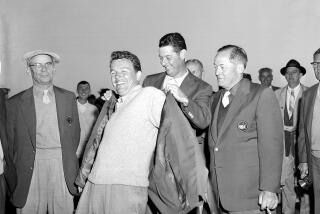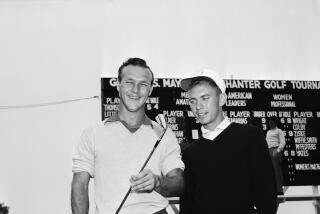The Grand Slammer : ‘Slammin’ Sammy’ Snead, Nearly 84, Hasn’t Lost Swing That Carried Him to a Record 81 PGA Tour Victories
- Share via
LA QUINTA, Calif. — It’s midday in the desert, and the sun is hot enough to melt the straw hat on Sam Snead’s head.
Snead is helping out at a clinic for the Liberty Mutual Legends of Golf and right in the middle of his remarks, the microphone quits working. All of a sudden, it’s quieter than a ball buried in a bunker. But Snead knows what to do. He drops the microphone and starts talking louder.
As it turns out, there’s no stopping Sam Snead. Never has been. Two months shy of his 84th birthday, Snead still hasn’t stopped talking or playing golf, even though the Legends usually is the only tournament he plays all year. Limiting his schedule is one of the few concessions Snead has made to age.
“How do I feel getting old?” Snead said. “Well, it’s nice to get here. But I’ll tell you, it’s not very pleasant on the golf course when I’m trying to hit 300-yard drives. It’s got to go downhill, hit a few rocks and a sidewalk now.”
Most of the time, Snead tries hitting a few bodies of water with a fish hook and a six-pound test line. He divides his time between Fort Pierce, Fla., and the Greenbriar in White Sulphur Springs, W.Va., and plays about two dozen rounds of golf a year. The rest of the time, Snead is either out fishing or planning to be out fishing.
“I always told people the only reason I played golf was so I could fish and hunt,” Snead said.
Maybe, but no one was more successful on the course. Snead won a record 81 PGA Tour events in a career that stretched from 1937 until 1979.
He won the Masters three times, the PGA Championship three times and the British Open once.
He won the PGA Seniors’ Championship six times, the last time when he was 61.
He led the year’s money list in three different decades: 1938, 1949 and 1950.
He made the playoff in the par-three contest before the 1992 Masters when he was 79.
He played on seven Ryder Cup teams, served as captain three times and never was part of a losing team.
Snead’s swing was so smooth, you could set music to it, which is sort of what Snead usually did as he played and hummed along at the same time. Byron Nelson, a contemporary of Snead’s, said there was always something special about the way Snead played the game.
“He had perfect rhythm in his swing, that was the main thing,” Nelson said. “Everything moved together. I’d call him loose-jointed. He could turn so freely. Sam could stand in a telephone booth and hit a golf ball perfectly.
“He played the game with abandon, kind of loose, whistling, skipping along. If there was something in his way on the course, he’d jump over it instead of move around it. He’s remarkable. He still swings the club beautifully. You can imagine what it looked like 50 years ago.”
Snead was “Slammin’ Sammy,” the always colorful, sometimes controversial big-hitting golfer from tiny Ashwood, Va., the son of cow and chicken farmers from just outside the town of 400, where it was said the moonshiners outnumbered the townspeople.
Snead’s father, Harry, earned $125 a month taking care of the boilers at a local hotel and farmed for extra money. He also was a member of the Hot Springs Fire Department and once won the state championship for hooking up a hose faster than anyone. But he never played golf. Laura Snead was 47 when Sam was born.
He picked up a golf club when he was 7, made $20 a month repairing clubs at the Cascades Inn at Hot Springs, then was hired as a teaching pro at the Greenbriar. The rest was golf history. Gene Sarazen said he ran into Snead for the first time in 1934.
“I never saw anybody swing as beautifully or hit the ball as well, this hillbilly from Virginia,” Sarazen said. “He had the soundest swing of all . . . better than Sarazen, better than [Bobby] Jones, better than [Walter] Hagen.”
Armed with all that, Snead won 135 tournaments worldwide, although Snead gives himself 165, including regional tournaments. He won the 1965 Greater Greensboro Open when he was 52 to become the oldest winner of a PGA Tour event.
Snead gives partial credit for that victory to Ed Sullivan.
“Well, they gave me a party before and Sullivan was the speaker,” Snead said. “I’m sitting on the dais and he says, ‘Wouldn’t it be wonderful if Sam could win this thing?’ And you know, something just hit me and I just raised up about six inches and I said, ‘By God, I’m going to give this all I got.’ I won by five.”
Snead’s 1954 Masters victory, when he beat Ben Hogan in an 18-hole playoff, was a classic. Snead and Hogan were tied at 289 after 72 holes and were tied again after nine holes of the playoff. Snead chipped in from 65 feet on No. 10 to lead by one shot, but Hogan got even on No. 12.
Snead took the lead with a birdie on No. 13, the par five that doglegs left. On the par-three 16th, Snead two-putted from 25 feet, but Hogan three-putted for bogey from 18 feet.
Both Snead and Hogan made par on No. 17 and Snead’s two-shot margin was just enough when he bogeyed the 18th after his approach missed the green and landed in a bunker. His margin of victory over Hogan was one shot.
“You know, Bob Jones asked Hogan once what Masters he thought was the greatest,” Snead said. “He said, ‘Hogan and Snead’s playoff.’ As far as I’m concerned, that’s right. You know, I’ve gone over that round, I could go right now and put the flags on the green, I could tell you what Hogan had on each hole, where he was. It was as good as I can play.”
The record shows that Snead could play very well indeed. To Pete Snead it was clear early on that his brother was destined for greatness.
“He could get more out of a golf ball with the least amount of effort than any man I’ve ever seen,” Pete Snead said. “And I’m not saying that just because he’s my brother. It was just natural. It’s not often you see that in a person.”
Pete, who will be 87 in July, lives in Pittsburgh. He and Sam are the last of Harry and Laura’s six children. Sister Janet died last year at 92.
There is a chance that Sam will alter his plans and play in the Tradition, April 4-7 in Scottsdale, Ariz., but the only thing of which he is certain is that he will show up in Augusta for the past champions dinner at the Masters.
Chances are, it’ll be a much different visit than the time in 1940 when Snead tried to make a few extra bucks by entering the monkey breeding business. He smuggled the monkeys into the United States, kept them on the train with him from Virginia to Georgia, then sneaked them past the desk clerk at the Hotel Richmond in Augusta.
Snead bought a big bird cage for the monkeys, left them some bananas and took off for a practice round. When he got back to his room, he discovered the monkeys had picked the lock and wrecked his room. He caught one after a chase, but it bit him.
Then the telephone rang. It was the hotel desk clerk.
“He said ‘If that party you’re throwing in your room doesn’t quiet down, we’ll have to ask for your key,’ ” Snead said.
Apparently, it didn’t work. The Snead party hasn’t been quiet since.
More to Read
Go beyond the scoreboard
Get the latest on L.A.'s teams in the daily Sports Report newsletter.
You may occasionally receive promotional content from the Los Angeles Times.










